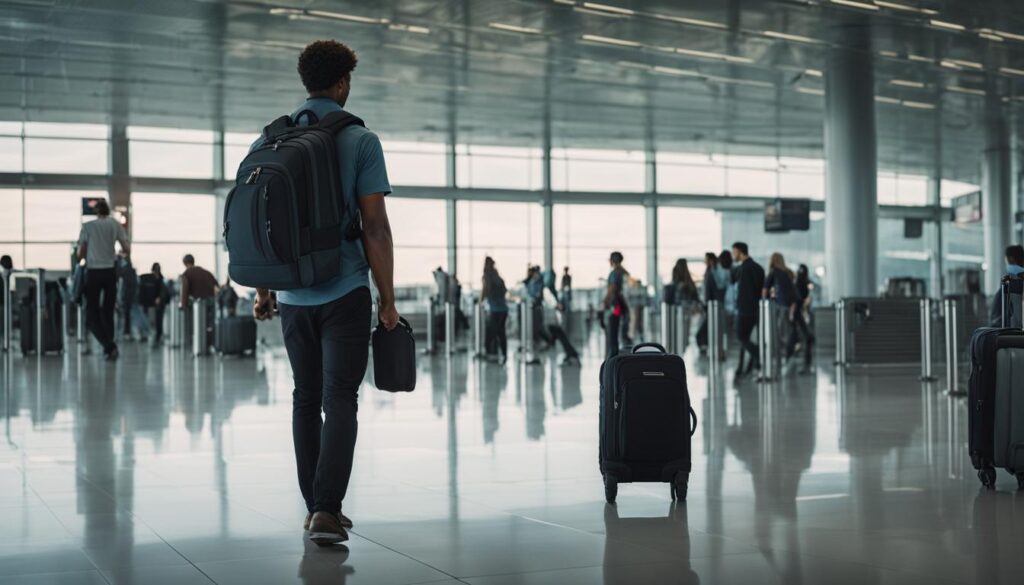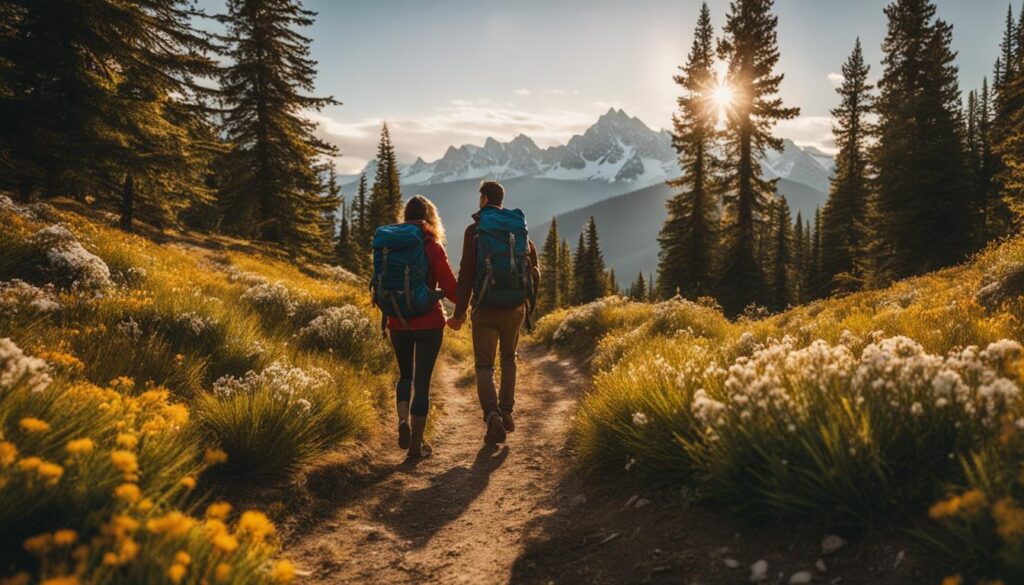We may earn money or products from the companies mentioned in this post.
Traveling to new destinations is an exciting experience, but it is important to prioritize your safety while exploring the world. By following essential travel safety tips, you can ensure a trouble-free journey while enjoying all the adventures that travel has to offer.
Whether you are a seasoned traveler or planning your first trip, these essential travel safety tips will help you stay secure and prepared for any unforeseen circumstances.
Key Takeaways:
- Prioritizing your safety is essential for a trouble-free journey.
- Always research your destination and be aware of any potential risks or safety concerns.
- Keep your travel documents and valuables secure at all times.
- Stay aware of your surroundings and trust your instincts if a situation feels unsafe.
- Always have a backup plan and emergency contacts in case of unforeseen circumstances.
Top Travel Safety Tips
Traveling is an exciting and fulfilling experience, but it can also be a cause for concern if you’re not adequately prepared. Here are some top travel safety tips and best practices to ensure you have a safe and enjoyable trip:
- Research your destination: It’s essential to do some research about your travel destination before embarking on your journey. Find out about the local customs, culture, language, and laws. Knowing these details will help you blend in, avoid any offenses, and stay safe.
- Register with your embassy: Register with your embassy or consulate before traveling to a foreign country. This process ensures that your government is aware of your presence in case of an emergency or natural disaster.
- Scan your important documents: Scan a copy of your passport, visa, and other essential travel documents and store them in a secure online location, such as Dropbox or Google Drive. You can also email them to yourself as a back-up.
- Stay aware of your surroundings: Whether you’re in a busy city or a remote village, stay alert and aware of your surroundings. Avoid walking alone at night, stick to well-lit areas, and be wary of anyone who approaches you.
- Keep your valuables safe: Keep your valuables, such as your passport, wallet, and phone, in a secure location. Never leave them unattended in public areas, and consider investing in a hidden pouch or belt to carry them around.
- Protect yourself from scams: Tourists are often targeted by scammers, so it’s essential to be cautious. Don’t trust anyone who approaches you offering unsolicited help or goods, and be wary of ATM skimming.
- Stay up-to-date on travel advisories: Check travel advisories and alerts in your destination regularly. The U.S. Department of State offers a free service that sends travel alerts and advisories through email or SMS.
By following these top travel safety tips and best practices, you can ensure a memorable and secure journey. Remember to stay vigilant, prepared, and open-minded to make the most out of your travels.
Travel Safety Precautions
Traveling to new destinations is an exciting experience, but it’s essential to keep safety in mind. By taking the necessary travel safety precautions, you can enjoy your trip without worrying about any potential risks. Here are some essential travel safety guidelines to keep in mind:
Research Your Destination
Before heading to a new destination, research the place to understand its culture, customs, traditions, and potential safety risks. Check the U.S. State Department website for travel advisories and warnings to stay informed about any potential risks.
Stay Connected
Stay connected with your loved ones at home and make sure they know about your travel plans. Keep them updated about your whereabouts, and provide them with copies of your travel documents, including your passport and travel insurance. In case of an emergency, they can assist you and help you get the necessary support.
Secure Your Belongings
Make sure to secure your belongings by using a lock or a safe, and always keep your valuables with you. Avoid carrying excess cash and credit cards, and do not leave your bags or belongings unattended in public areas.
Be Alert
Be alert and attentive to your surroundings at all times. Avoid walking alone late at night, especially in unfamiliar areas. If you’re lost or need directions, ask for help from a reputable source like hotel staff or law enforcement personnel. Avoid sharing personal information with strangers and always trust your instincts.
Get Travel Insurance
Invest in a travel insurance policy that covers medical emergencies, trip cancellations, and other potential risks. This will ensure that you are protected in case of an unexpected event such as illness, injury, or natural disaster.
Learn Basic Phrases
Learning basic phrases in the language of your destination can be helpful in communicating with the locals and understanding their customs and traditions. This will help you navigate the area and avoid any misunderstandings.
By following these travel safety precautions, you can ensure a safe and enjoyable journey. Remember, being prepared and cautious is the key to a successful trip.
Expert Travel Safety Tips
Whether you’re a seasoned adventurer or a first-time traveler, taking precautions to ensure your safety on the road is crucial. Here are some expert travel safety tips to help you stay secure during your journey:
- Do your research: Before embarking on your trip, take some time to research your destination. Be aware of any potential risks, such as political unrest or high crime rates, and plan accordingly.
- Stay aware: When traveling, it’s important to stay aware of your surroundings. Avoid using your phone or other distractions when walking alone, and be cautious in crowded or unfamiliar areas.
- Make copies of important documents: In case your passport or other important documents get lost or stolen, make copies and keep them in a separate location from the originals. This will make it easier to replace them in case of an emergency.
- Secure your belongings: Keep your belongings secure at all times, especially when traveling on public transportation or in crowded areas. Use a money belt or other discreet method to carry your valuables and avoid carrying large amounts of cash.
- Be careful with public Wi-Fi: When using public Wi-Fi, avoid accessing sensitive information such as online banking or email accounts. Hackers can easily access this information on unsecured networks.
- Trust your instincts: If something feels unsafe or uncomfortable, trust your instincts and remove yourself from the situation. Your safety should always be your top priority.
By following these expert travel safety tips, you can enjoy a worry-free journey and focus on creating lasting memories. Remember, your safety is in your hands, so always stay alert and prepared for any situation.
How to Stay Safe While Traveling
When traveling to new destinations, it’s important to prioritize your safety. By following a few simple tips and practices, you can ensure a smooth and secure journey. Here are some essential tips on how to stay safe while traveling:
- Research your destination: Before traveling, research your destination to learn about local customs, laws, and potential safety hazards. This can help you avoid dangerous situations or misunderstandings.
- Stay aware of your surroundings: Be alert and aware of your surroundings at all times, especially in crowded areas or unfamiliar neighborhoods. Avoid walking alone at night and stay on well-lit, busy streets.
- Protect your valuables: Keep your valuables, such as passports, cash, and electronics, in a secure location, such as a hotel safe. Avoid carrying large sums of money or displaying expensive jewelry.
- Stay in touch: Keep in touch with friends, family, or travel partners throughout your trip to let them know your whereabouts and any changes to your plans. Make copies of important documents, such as your passport and itinerary, and keep them in a separate location.
- Be cautious of strangers: Be cautious of strangers who approach you, especially those who seem overly friendly or insistent. Avoid accepting rides or invitations from people you don’t know, and use caution when sharing personal information.
“By following a few simple tips and practices, you can ensure a smooth and secure journey.”
By following these tips, you can minimize the chances of encountering safety hazards during your travels. Remember to always stay vigilant and prepared for any unforeseen circumstances, and don’t hesitate to seek help if needed. With these tips in mind, you can enjoy your travels with peace of mind knowing you’ve taken the necessary precautions to stay safe and secure.
Conclusion
In conclusion, prioritizing travel safety is crucial for a trouble-free journey. By following the essential travel safety tips provided in this guide, you can confidently explore new destinations while ensuring your well-being. Always remember to:
Be Prepared
Keep important documents and contact information on hand, have a plan in case of emergencies, and research your destination beforehand.
Stay Vigilant
Pay attention to your surroundings, trust your instincts, and be aware of potential dangers.
Practice Good Judgment
Make informed decisions and avoid unnecessary risks. Be respectful of local laws and customs.
Implementing these travel safety practices can significantly reduce the chances of encountering unforeseen situations and enhance your overall travel experience. Safe travels!
FAQ
What are some essential travel safety tips for a trouble-free journey?
We recommend the following travel safety tips to ensure a trouble-free journey:
- Research your destination and be aware of any potential risks or safety concerns.
- Keep your valuables secure and avoid displaying them in public.
- Always have a copy of your important documents, such as your passport and travel insurance.
- Stay in well-lit and populated areas, particularly at night.
- Be cautious of your surroundings and trust your instincts.
- Keep emergency contact numbers handy and know how to access local emergency services.
What are the top travel safety tips for every traveler?
Here are some top travel safety tips that every traveler should know:
- Be cautious of your belongings and keep them within sight at all times.
- Avoid sharing too much personal information with strangers.
- Use secure and reputable transportation options.
- Stay updated on local news and events that may affect your safety.
- Follow any safety guidelines or warnings provided by local authorities.
What travel safety precautions should I take before and during my journey?
To ensure your safety before and during your journey, we recommend taking the following precautions:
- Check travel advisories and warnings for your destination.
- Make sure your accommodations are secure and well-reviewed.
- Inform someone of your travel plans and maintain regular communication.
- Carry a basic first aid kit and any necessary medications.
- Secure your electronic devices and use secure Wi-Fi connections while traveling.
What are some expert travel safety tips?
Here are some expert travel safety tips to enhance your overall travel experience:
- Research the local customs and cultural norms of your destination.
- Pack a small portable safe to store your valuables securely in your accommodation.
- Keep a discreet profile and avoid flaunting expensive items.
- Be cautious when using public Wi-Fi networks and consider using a VPN for added security.
- Blend in with the locals by dressing appropriately and respecting local traditions.
How can I stay safe while traveling?
To stay safe while traveling, we recommend the following tips:
- Stay aware of your surroundings and trust your instincts.
- Avoid walking alone in unfamiliar or dimly lit areas.
- Keep emergency cash and a photocopy of your identification separate from your wallet or purse.
- Use reputable transportation options and be cautious of unlicensed taxis or rideshare services.
- Stay updated on any travel warnings or advisories for your destination.
Affiliate Disclosure: This post may contain affiliate links. If you purchase through our link, we may receive a small commission, but at no additional cost to you. For more information, please see our Disclosure statement.



